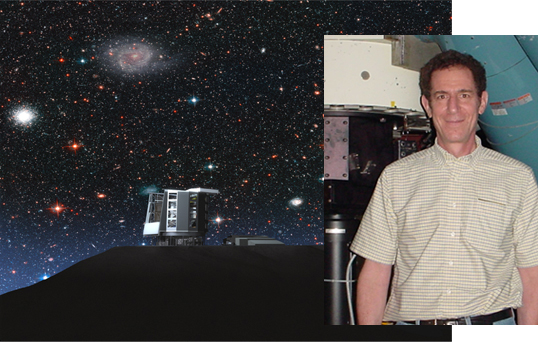 Exploring Newly Discovered Worlds with the Giant Magellan Telescope
Saturday, February 12, 2011
Dan Jaffe
Abstract Less than two decades ago, mankind knew about only one planetary system: our own. Since the discovery of the first extrasolar planets in 1995, a furious effort by the astronomical community has led to the discovery of hundreds of extrasolar planets. Many of these systems look very different from our solar system, having massive planets close to the parent stars while ours are far from the Sun, and/or planets in highly eccentric orbits, where most orbits in the Solar System are quite circular. The high contrast between the brightness of the parent stars and the faintness of the planets makes it very hard to obtain concrete information about the planets themselves: How and when do they form? How massive and how dense are they? How hot are they? Do they have atmospheres and what are these atmospheres made of? A new generation of large ground-based telescopes, including the Giant Magellan Telescope , in which UT Austin and Texas A&M are partners, will afford us the first direct measurements that can address all of these questions for exoplanets approaching the size and mass of planets like the Earth but residing in star systems many light years away. GMT in particular, with its superb high-contrast imaging and its Innovative capabilities for infrared spectroscopy, will be able to move us from an era of detection to one of real exploration. I will discuss the exciting future of extrasolar-planet studies and how it builds on the solid foundation of the current exoplanet research that forms an important part of the current program in Texas. Dan Jaffe grew up in Manhattan, where only four stars come out at night and where telescopes are only used to look into the windows of apartments across the street. He got his undergraduate and graduate degrees at Harvard and did research at the University of Chicago and UC Berkeley before joining the UT Astronomy faculty in 1986. Prof. Jaffe has won numerous awards including the Bok Prize, German Academic Exchange Service (DAAD) and Alexander von Humboldt Fellowships, a Packard Foundation Fellowship, and the CNS and BoV teaching awards. Throughout his time at UT, Dan has involved graduate and undergraduate students in research that includes astronomical observations and the development of state-of-the-art instrumentation for infrared and submillimeter spectroscopy. This work includes development of new types of diffraction gratings that are now being used in the FORCAST instrument on NASA's SOFIA airborne telescope and that will be used on the James Webb Space Telescope, the successor to Hubble. His astronomical interests range from the formation of stars and planetary systems to the early phases of stellar evolution and the nature and origin of brown dwarfs. His current research revolves around a need to understand how disks of gas and dust around newly formed stars manage to transform themselves into planets and minor bodies in a relatively short time. Dan is deeply involved in the development of the Giant Magellan Telescope. He currently leads a Korean-UT team in a study of an innovative spectrograph for the GMT, and he served until recently as the Chair of the GMT Science Advisory Committee. The Great Lectures in Astronomy series features distinguished speakers presenting a topic in modern astronomy for interested non-astronomers. The lectures are sponsored by the Department of Astronomy and McDonald Observatory Board of Visitors. |